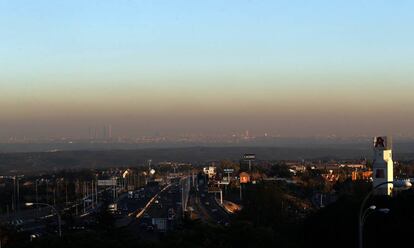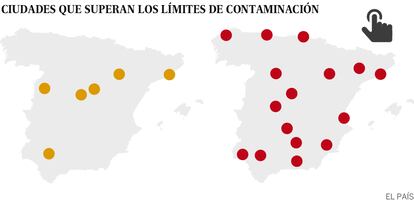Pollution is choking Spain’s cities
Almost 20 urban areas across the country have breached air quality standards in the past two weeks

Pollution is choking Spain’s main cities, a situation that is being exacerbated by atmospheric stability and a lack of rain. In the last two weeks alone, 18 cities exceeded European Union limits for nitrogen dioxide (NO2) and particulate matter (PM10), according to the green group Ecologists in Action.
Madrid is by far the worst offender when it comes to exceeding limits for carbon dioxide (set at 200 µg/m3) and tiny polluting particles.
The limits are being breached in many cities and no one is doing anything Juan Bárcena, Ecologists in Action
“The limits are being breached in many cities and no one is doing anything about it,” warns Juan Bárcena, who is in charge of air quality issues at Ecologists in Action.
Madrid
The capital has had pollution issues for years. An almost permanent halo of smog hovers over the city. Once again, Madrid City Hall is taking steps to try to alleviate the situation, one of just two cities in Spain to do so. On November 18, officials activated the level 2 scenario of its anti-pollution protocol, banning non-residents from parking in regulated parking zones (SER), as well as adjusting the speed limit on the M-30 beltway and other access roads to 70 km per hour.
Madrid is taking measures to try to alleviate the situation, one of just two cities in Spain to do so
Madrid spews more nitrogen dioxide into the air on an hourly basis than any other Spanish city, reaching a maximum of 341 µg /m3 at one monitoring station between November 15 and 19. This is 141 µg /m3 over the limit. In the same period, it also exceeded the EU limit on PM10 particles. On Tuesday last week, 11 monitoring stations were over the daily nitrogen dioxide limit on 32 occasions, according to official city statistics.
Barcelona
The Catalan capital exceeded the nitrogen dioxide limit at the Gràcia monitoring station on November 17. Since then, the main problem has been the density of PM10 particles, according to local authorities. The worst levels were registered on November 20 and 21, when the Eixample monitoring station shot up to 55 µg /m3 of PM10. Over the last week, Barcelona has not placed any restrictions on traffic, despite the pollution being visible on November 17 and 22. However, the city has plans to restrict vehicle numbers from December 1 in the event of excess air pollution.

Zaragoza
The capital of Aragon has exceeded both NO2 and PM10 limits. Though it has traditionally been recognized for its air quality, it has also suffered from a lack of rain in the last few months. Over the last week, the situation has grown worse and City Hall has announced it will adopt a course of action to deal with such episodes in the future as part of their plan for sustainable mobility.
Seville
The Andalusian city registered the worst levels of air quality between November 17 and 19 at three monitoring stations. Like Madrid, Barcelona and Zaragoza, its problems were with NO2 and PM10. The city has not taken any measures to counter the pollution, though Seville does have the biggest network of bicycle paths in Spain.
Ecologists in Action has criticized authorities in Valencia for not acting in time
Valencia
Although Valencia has managed to keep down its hourly nitrogen dioxide levels over the last week, it did register the second biggest concentration of PM10 in Spain at one monitoring station between November 15 and 19. On November 22, the city adopted measures that merely inform and advise residents on issues such as such as avoiding intense exercise outdoors. Ecologists in Action has criticized the authorities in Valencia for not activating the protocol earlier.
Valladolid
Like Valencia, Valladolid has maintained hourly NO2 levels below the permitted threshold while its PM10 levels breached the daily limit. On November 22, city officials warned that the daily PM10 quota had been exceeded at two monitoring stations, prompting them to activate the protocol for a level 2 scenario, restricting speed on access roads and within the city while preparing to increase public transportation services.
English version by Heather Galloway.
Tu suscripción se está usando en otro dispositivo
¿Quieres añadir otro usuario a tu suscripción?
Si continúas leyendo en este dispositivo, no se podrá leer en el otro.
FlechaTu suscripción se está usando en otro dispositivo y solo puedes acceder a EL PAÍS desde un dispositivo a la vez.
Si quieres compartir tu cuenta, cambia tu suscripción a la modalidad Premium, así podrás añadir otro usuario. Cada uno accederá con su propia cuenta de email, lo que os permitirá personalizar vuestra experiencia en EL PAÍS.
¿Tienes una suscripción de empresa? Accede aquí para contratar más cuentas.
En el caso de no saber quién está usando tu cuenta, te recomendamos cambiar tu contraseña aquí.
Si decides continuar compartiendo tu cuenta, este mensaje se mostrará en tu dispositivo y en el de la otra persona que está usando tu cuenta de forma indefinida, afectando a tu experiencia de lectura. Puedes consultar aquí los términos y condiciones de la suscripción digital.









































